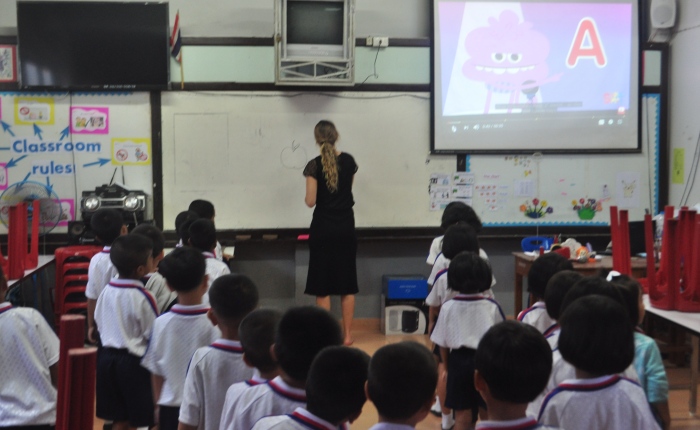For 5 months, I have been living and teaching in a tiny jungle town in Southern Thailand. In Sawi we have one 7/11, a few places to eat, no bars, and nowhere to go but the weekly market. There are no “farangs” living or visiting here, other than the other 5 teachers in town. Meeting a Thai person with more English than “hello, how are you” is always a shocking experience here. If you want something to eat, you ought to know the Thai words for “chicken”, “pork”, “spicy”, “rice” and “egg” at the very least. The culture here is distinctively Thai and has not been at all diluted by western travelers.
This comes with the generosity and compassion that strangers, shopkeepers, neighbours and colleagues share with us, as I wrote about in a previous post. It also comes with a laid back “mai pen rai” or no problem attitude to almost everything, including last minute requests, schedule changes, forgetfulness, and what we would consider a quite disorganized way of doing things. Thai culture here also means respect.
Teachers here have one of the most respected positions in society, which is evident in the expectations for maintaining decorum outside of school as well as the treatment teachers receive within the community. It’s not uncommon for me to feel like a celebrity in our 7/11, with all eyes on the farang, and staff calling out “teacher! Your coffee!” Letting anyone in town know that you are a teacher is sure to be met with a big smile and maybe even a discount.
The students here also exemplify these elements of compassion and respect in their behaviour. Walking around the school I am greeted with endless calls of “Hello teacher!” and “Good morning teacher!” While they are primary kids, and their attitude in class is sometimes rambunctious or disinterested, they have respect for school and learning.
One of my first lessons for my grade fours and fives was on Thanksgiving. I taught the students about the importance of this holiday as a time for showing gratitude or thankfulness for the good things we have in our lives. Once they got the concept and we got the ball rolling with some brainstorming, they were able to come up with the most wonderful lists of things they were thankful for. These lists always included things like family, friends, health, but then went on to include teacher, school, police, fire-fighters, doctors and nurses, medicine, the King, Thailand, farmers, nature, animals, food and water, the sun and the moon.
Their ability to appreciate and be grateful for the things we all take for granted was apparent with each class I taught this lesson to. Every single class included “teacher” and “school” early on in the list, something I doubt we would see in a Canadian classroom. Sure, they are lazy and tired sometimes, but I see a genuine interest in learning in most of these students.
Despite how sweet and wonderful my students can be, teaching here has not been without it’s difficulties.It’s made me come to appreciate the careers of both my parents so much more, who are both recently retired teachers. Wow, I had no idea what they went through. Teaching may have nice hours, good pay, and good vacation time in most places. But these benefits come at the expense of the most challenging and at times stressful position I have experienced.
Being a primary teacher means you are basically a mix between an entertainer and a babysitter. Lose their attention for a second and you’re done. This is not even taking into consideration that my students don’t understand simple commands in English like “raise your hand to speak” or “answer my question, don’t repeat after me”. Sometimes my classes are a total shit-show. Sometimes halfway through a lesson I accept that they aren’t going to learn anything today.
But sometimes, it goes well. I manage to make them laugh and keep their focus. They grasp a difficult concept or impress me by asking to go to the bathroom in perfect English. A student with behaviour problems actually gets engaged and demonstrates that he’s actually one of the smartest kids in class when he tries. These moments have kept me going. But I have definitely learned that I could not make a career of this. It’s been an experience so much more draining and demanding then I could have imagined. And so much more rewarding than I ever could have known.
Today is my last day at Anuban Sawi School. After this weekend we will be heading off on a new and exciting adventure. Living in Sawi has been so eye-opening in so many ways. It is the first (but I’m sure not the last) home that I’ve ever had outside of Canada. We’ve fallen into a routine and a lifestyle here that is so different than anything we’ve ever known, yet so natural at the same time.
There are so many things I will miss about the lifestyle we have created in Sawi, and so many children at this school who have touched my heart. But it’s time to step into uncharted territory. Our new home is the road.




Such a beautiful post! You really a talent for writing, Hannah ✏🙌🙌🙌
Great description of your experiences. I really felt like was there with you!
Good luck on your next adventure ❤
LikeLike